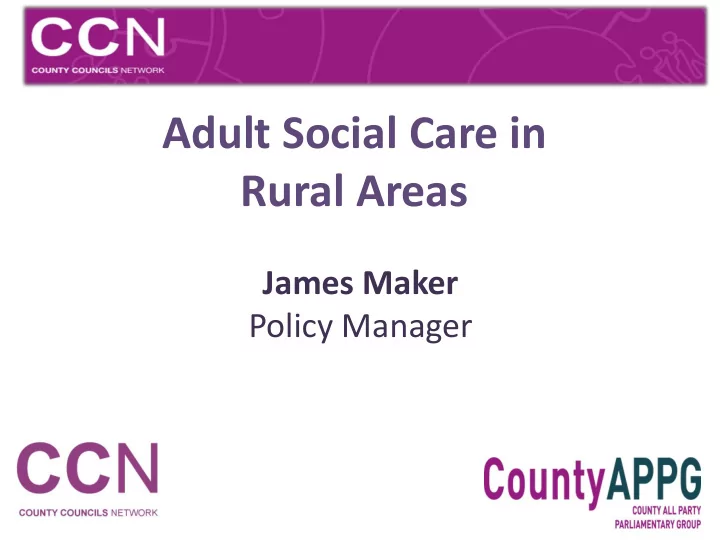

Adult Social Care in Rural Areas James Maker Policy Manager
What we represent….. What we do… 27 County Councils LGA Special interest Group CCN Conference 10 Unitary Councils CCN Conference Advocacy 23 million People 47% of Pop/55% 85s Policy Communications Development 86% England Landmass
CCN Activity on ASC - What have we done up to now? 2014 2015
County APPG Inquiry “Integrated care and support: the future of adult social care in county areas” • What are the opportunities, barriers and challenges facing counties and local partners in delivering an integrated health and social care system? • What precise measures and policy interventions can a) Central Government, and, b) local partnerships, do to overcome challenges, remove barriers and better integrate care and support? • What is the future shape of adult social care provision in county areas?
County APPG Inquiry – Key Findings The State of Care in Counties: Campaign Video Share the video via - http://www.countycouncilsnetwork.org.uk/appg-inquries/
Nottinghamshire …..‘ the challenges are compounded by the disparity in pay and Terms and Conditions of employment with County APPG Inquiry – Key Findings health care staff generally having better T&C and pay’ . The State of Care in Counties • Population sparsity leads to higher delivery costs and makes it more difficult for commercial providers to keep Lancashire their staff. Rurality also leads to complex care markets. ’ We have a very large and fragmented care provider market, with almost four hundred care homes for older people and almost two hundred home care providers. Relating to so many providers is challenging, as is LG Futures ……specific cost drivers shaping and influencing such a market. Providing associated with rural service delivery led domiciliary services in rural areas, where fewer to ‘a substantial cost penalty’ for providers operate, travel time is much greater and staff predominately rural areas. They argued more difficult to recruit .’ that ‘the provision for sparsity within the formulae is very small compared to the size of the actual cost penalty’.
County APPG Inquiry – Key Findings The State of Care in Counties • Wide geographical areas also create organisational challenges for the large and complex health economies in rural county areas. North Yorkshire …… 1 County and 7 Borough and District Councils, 5 Clinical Commissioning Groups, 4 main Acute NHS Trusts and 3 Mental Health Trusts, over 4000 voluntary sector organisations and multiple independent sector providers, as well as a high proportion of people who fund their own care, there is significant complexity in the commissioning and delivery of health and social care services” Lincolnshire County Council “Working in a two tier area presents additional complexity and resources to manage it. Lincolnshire has four CCGs and 7 district/city councils. The challenge of obtaining consensus is therefore self- evident and is further complicated with a mixed political make up within the local Government system.”
County APPG Inquiry – Key Recommendations Too address rural challenges……. a) Larger or entirely pooled budget; b) New delivery structures and; c) Enhanced local powers to As part of the 2015 Spending Review the commission services. Government must conduct a full review of the sustainability of adult social care, including allocation formulae and with a particular focus on rebalancing the allocation older persons Relative Needs Formula (RNF) per head of population.
County Devolution, part of the solution? What would a “Deal” mean in a rural county…. • Agree a larger or entire locally • Local authorities conduct a full Enhanced commissioning review of their membership of pooled budget. and financial powers for HWBs. Health and Wellbeing Boards • Removal of all restrictions on • Local partners are given freedom pooled budgeting and a ten year to review and rationalise CCGs and shared financial settlement for their boundaries, seeking health and social care. • Enabling HWBs to commission coterminosity with local authority primary, secondary health and boundaries where possible. social care services • Local partners are given greater freedom to agree robust, • Partners are given greater freedom transparent and accountable • Powers to scrutinise and align and flexibility to explore how HWBs performance management commissioning plans of CCGs interact within wider governance frameworks should be strengthened. arrangements, including Combined Authorities. • Local authority partners consider Empowered leadership, the pooling or delegation of Devolved budgets & reformed governance and specific housing and health performance management direct democratic related services. accountability
James Maker CCN Policy Manager James.maker2@local.gov.uk 0207 6643009 Questions? Michael Chard Senior Policy Officer Michael.Chard@local.gov.uk 0207 6643009
Recommend
More recommend